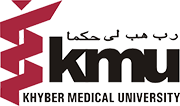Training on Laboratory Biorisk Management(BRM) at KMU
The Khyber Medical University Public Health Reference Laboratory (KMU-PHRL), Peshawar organized a three days hand-on training on Bio-Risk Management (BRM). The training was conducted in collaboration with WHO and NIH, Islamabad. The objectives of the training included introduction to Laboratory Biosafety Manual (LBM4) and capacity building of the personnel working with infectious pathogens including COVID-19 at provincial and divisional laboratories in Khyber Pakhtunkhwa. Overall, representatives from 14 different public and private sector laboratories of KP participated in this training. Lectures and hands-on sessions were facilitated by Dr. Hafsah Muhammad, Dr. Yasar Yousafzai from KMU, and Dr. Uzma Amir, Mr. Sajid Ali from WHO and Ms. ShaziaAdeel, Ms. Zurva Ashraf from NIH, Islamabad. The training covered all the major aspects of on-ground Biological Risk assessment and mitigation strategies. Home assignments and virtual follow-up sessions will be continuing till end of February to facilitate the participants in performing risk assessment at their own institutes.
It is worth mentioning that KMU has been focusing on the Biosafety and BRM since early 2017 and since then, have achieved several milestones in the development of KMU Biosafety Program. BRM is an essential component of laboratory strengthening in line with the IHR 2005. The fourth WHO LBM4 with the associated seven monographs has been recently released and focuses on a practical, risk and evidence-based, technology-neutral and cost-effective approach to biosafety with emphasis on adoption of a “safety culture” in laboratory management.
Chief Guest, Dr. Niaz Muhammad Director General Health Services KP, Vice Chancellor KMU Prof. Dr. Zia ul-Haq and Registrar KMU Prof. Dr. Muhammad SaleemGadapur graced the closing ceremony of thesaid training workshop. Dr. Niaz Muhammad appreciated the efforts of the leadership of KMU, especially Prof. Dr. Zia ul-Haq and the entire workforce of KP-PHRL for playing a very significant and exemplary role during COVID-19 pandemic by working selflessly round the clock. Hehoped that the workshop would not only help the participants to understand the basic information and requirements of Biosafety, but also enhance their professionalcapacity as well as their safety. He appreciated KMU's efforts and hoped that such training workshops would be continued in the future.At the end of training, certificates were distributed among the participants and facilitators.
